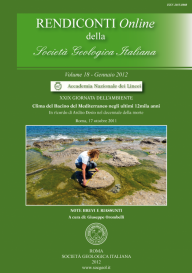
Il significato paleoclimatico dei carbonati continentali olocenici centro-sahariani: memoria delle forzanti orbitali e di eventi climatici rapidi
Andrea Zerboni (*,**) & Mauro Cremaschi (*,**)
(*) Dipartimento di Scienze della Terra "A. Desio", Università degli Studi di Milano, Via L. Mangiagalli 34, 20133 Milano, Italy. E-mail: andrea.zerboni@unimi.it
(**) IDPA-CNR, Via L. Mangiagalli 34, 20133 Milano, Italy.
DOI: https://doi.org/10.3301/ROL.2011.66
Volume: 18/2012
Pages: 42-45
Abstract
Palaeoclimatic significance of Holocene continental carbonates from the central Sahara: memory of orbital forcing and high frequency events.
We identified in the hyperarid central Sahara several outcrops of freshwater continental carbonates, formed in correspondence of former springs and in lake sedimentary environments. They are not in equilibrium with the present-day environmental and climatic conditions and therefore they indicates a wetter period dating to the Holocene. Sampled deposits were submitted to radiometric dating (U-series and 14C) and stable isotopes were measured to get palaeoclimatic information. Calcareous tufa from fossil springs in the Tadrart Acacus massif confirm higher precipitation for the early Holocene and a their progressive decline later on; springs dried out at c. 8000 years BP. At the mean time, the outcrop of the water table in the edeyen of Murzuq allowed the formation of constant and freshwater piezometric lakes. As a consequence of decreased rainfalls, the level of the lakes fell at c. 8000 years BP; after few centuries of aridity, the level of the water raised again. Geochemical, sedimentological, and paleontological analyses demonstrate that lakes suffered seasonal oscillations of the level. Our data confirm that the African Humid Period began soon after the Pleistocene/Holocene transition and the intensity of precipitation strongly decreased during the middle Holocene, in accordance with the modifications of the orbital forcing. Moreover, the central Saharan carbonates recorded also a short arid phase that is in relation with the 8.2 BP event.
Keywords
Get Full Text